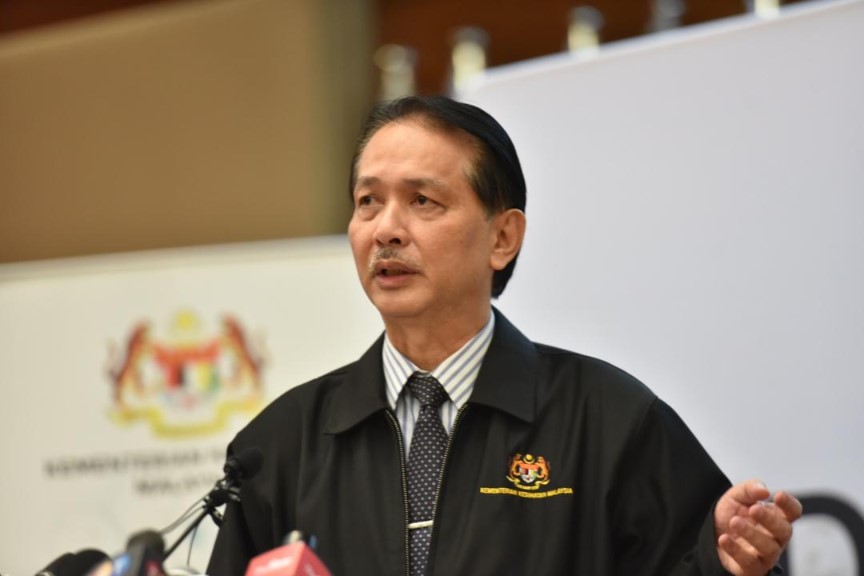KUALA LUMPUR, July 23 — The Ministry of Health (MOH) today reported nine new coronavirus cases, breaking a string of daily cases above 10 since July 19.
Health director-general Dr Noor Hisham Abdullah said six of today’s nine new cases were local transmissions, comprising four Malaysians and two foreigners, while the other three were imported infections.
Four of the local community transmissions involving Malaysians were located in Sarawak, while the two foreigners who were infected locally comprised a screening before release from prison in Sabah, as well as a detainee screened in prison in Kelantan before transfer to an immigration detention depot.
Five Covid-19 patients are being treated under intensive care, including two on ventilator support. No new deaths from coronavirus were reported today, with the nationwide death toll remaining at 123 cases.
According to the Sarawak Disaster Management Committee (SDMC), three of the four new Covid-19 cases were related to the Stutong market, Sentosa hospital, and engineering company clusters each, all located in the state capital of Kuching.
The fourth case was a local woman who came forward for screening at a public health clinic in Kuching on July 21, with positive PCR test results on July 23.
“The actual reason on why the case went for screening is still under investigation, while her connection to any other cluster or positive Covid-19 case is still under further investigation,” SDMC said in a statement.
SDMC said none of the four new cases in Sarawak showed any symptoms of the Covid-19 disease.
15 New Clusters Nationwide Since July 1
MOH noted that 15 new clusters have been reported since July 1 across the country, while daily cases of late have sometimes reached double digits. Just three weeks ago on July 1, authorities reported only one Covid-19 case that day, the lowest daily record during the current second wave of the virus. Local transmissions had also hit zero for a few days before this.
“The rising trend of daily cases and new clusters was most probably caused by public complacency and non-compliance with the government’s instructions and advice in handling the outbreak,” Dr Noor Hisham said.
He also noted that 10 per cent of 18,416 people under surveillance who ended home-quarantine after returning from abroad did not get screened for Covid-19 on Day 13 of their quarantine. As of today, 31,674 people who returned from overseas have been put under the home surveillance order for 14-day self-quarantine.
Data on the federal government’s MySejahtera showed a drop in the number of check-ins at various premises like restaurants and markets for the past three weeks, despite an increase in the number of registered users with the contact tracing app.
“This shows that compliance with SOP (standard operating procedures) is dropping.”
MOH also found that between July 7 and July 20, nearly a quarter, or 24.8 per cent, of people put under the home surveillance order did not use MySejahtera’s home assessment tool to monitor their own condition every day during their 14-day home quarantine.
WHO Guidance On Fabric Masks
MOH released the World Health Organization’s (WHO) guidelines on the use of three-layer fabric non-medical masks for the general public.
- The innermost layer must be able to absorb water, like cotton or a cotton mix.
- The outermost layer must be made of a water-resistant (hydrophobic) material, like polypropylene, polyester, or a mix. This layer can prevent outside contaminants from entering the nose and mouth of the wearer.
- The middle hydrophobic layer is made of non-synthetic material like polypropylene, or cotton that can filter or withstand water droplets.
“Besides that, half-face coverings must be worn correctly and cover the area from the nose to the chin. Leaving it hanging at the neck, forehead, or covering only part of the nose and mouth is inaccurate usage and carries the risk of contamination or infection to the wearer,” Dr Noor Hisham said.
Senior Defence Minister Ismail Sabri Yaakob said earlier today that face masks would be made mandatory in public spaces, such as public transport, crowded areas, and places where social distancing is impossible, from August 1.
Failure to comply with the rule may be subject to prosecution under the Prevention and Control of Infectious Diseases Act 1988 that provide for a fine of up to RM1,000, he said.








